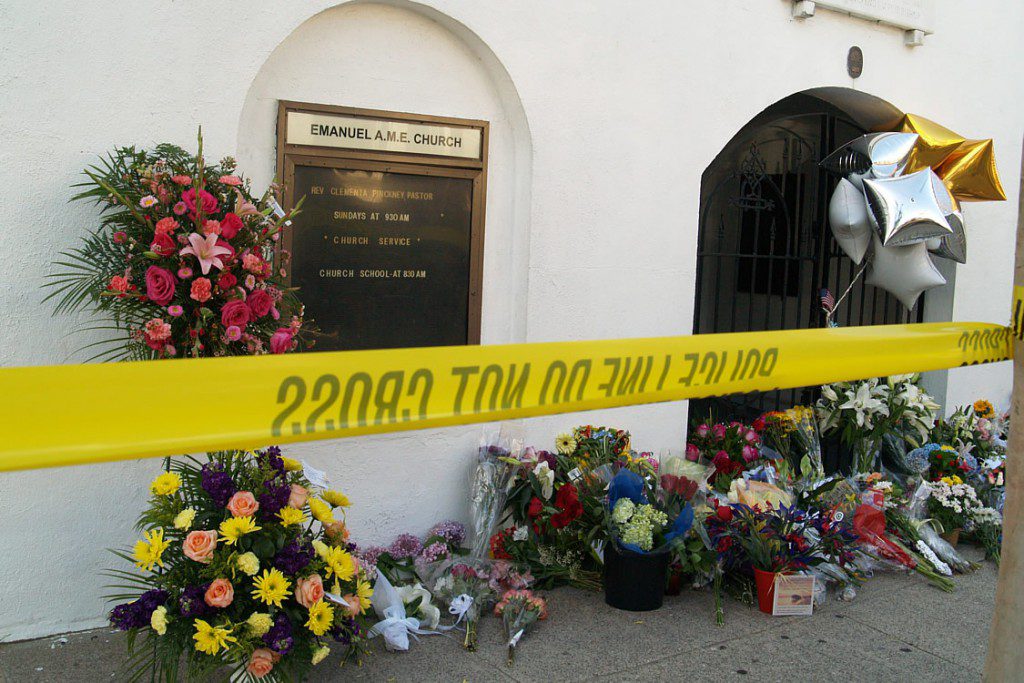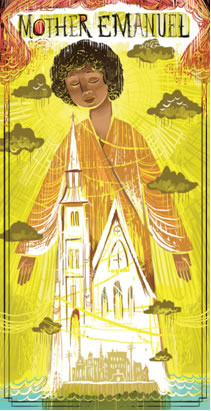
Dozens of bouquets lined a sidewalk last year outside Emanuel AME Church in Charleston.
By Andy Brack, editor and publisher | Almost a year later, the remarkable words of family members in pain still ring in our ears.
“I forgive you,” one said in a crowded courtroom. “May God have mercy on you,” another added. “Hate won’t win,” said a third.
 One after another, five people squeezed by turmoil forgave an accused killer, who stood pancake-faced in shackles in a separate room and watched his bond hearing on a television screen.
One after another, five people squeezed by turmoil forgave an accused killer, who stood pancake-faced in shackles in a separate room and watched his bond hearing on a television screen.
The world listened. And despite a lot of hurt and anger, a powder keg of resentment and mistreatment that had erupted in other communities didn’t explode in Charleston following the murders of nine people at Emanuel AME Church.
Instead of riots and conflict, the world witnessed a community where people held on to each other and didn’t mimic the killer’s hate. Had words of forgiveness from a daughter, husband, mother, granddaughter and sister not been uttered as a response for the evil that took away their loved ones, there’s no telling what would have happened. Their strength and faith unified a community numbed by how anyone could enter a house of worship, pray for an hour and then fire 77 bullets.
The capacity for forgiveness doesn’t mean people aren’t angry, even today. But being forgiving is a way of managing rage — of compartmentalizing emotional turmoil and turning it over to a higher authority as a way to persevere.
It’s also a legacy of slavery, the Rev. Joseph Darby of Charleston told writers of a new book, “We Are Charleston,” which explores what happened at the church, its history and the legacy of the events of June 17, 2015.
“If you have no prospects to escape, you try to figure out how to forgive so that you can move on for your own psychological well-being,” Darby said. “I think that’s baked into the Southern African American experience. That doesn’t mean I absolve you of all responsibilities; it just means I forgive you.”
Hating and acting out based on hate lets the hate win. It can be all-consuming and lead to destruction. But by forgiving and not acting out, people — even angry people — keep their dignity and do not lose their humanity. A powerful passage in the book illustrates:
“Whatever we may believe, the power of the families’ statements is larger than them. Their strength seemed to come from somewhere else, and who can say where faith resides? Their words touched something deep inside each of us. [Family member Anthony] Thompson says that as soon as he spoke, he began to experience peace. ‘When I sat down, I was a different person. I wasn’t the person thinking like when I came in there [into the courtroom], “What happening to my wife?” No more. I said, “God, you’ve got her; you gave me my peace this morning.” I knew where to go from there. I still just don’t know exactly what to do, but I knew not to dwell on the tragedy anymore. And I never dwell on [accused killer] Dylann Roof for one minute, for one second.’”
 Forgiving doesn’t mean forgetting. The tragedy at Mother Emanuel AME Church still is raw. You see it as people still leave flowers in front of the church on Calhoun Street. You see it in the bowed heads of visitors who make a point to stop by, say a private word and pay their respects.
Forgiving doesn’t mean forgetting. The tragedy at Mother Emanuel AME Church still is raw. You see it as people still leave flowers in front of the church on Calhoun Street. You see it in the bowed heads of visitors who make a point to stop by, say a private word and pay their respects.
The new book by poet laureate Marjory Wentworth, veteran reporter Herb Frazier and historian Bernard Powers Jr. may help you understand why the events after the tragic shooting turned out in Charleston the way that they did and how the community seems stronger now than ever before.
A year after the shootings, I’m not sure I will ever be able to forgive as quickly and with the grace, dignity and strength of the relatives of those who died. But I’m thankful for their strength — thankful for their continuing inspiration that serves as a lesson to all of us to set aside petty differences and work together to strengthen our bonds of friendship, community and state.



 We Can Do Better, South Carolina!
We Can Do Better, South Carolina!
























